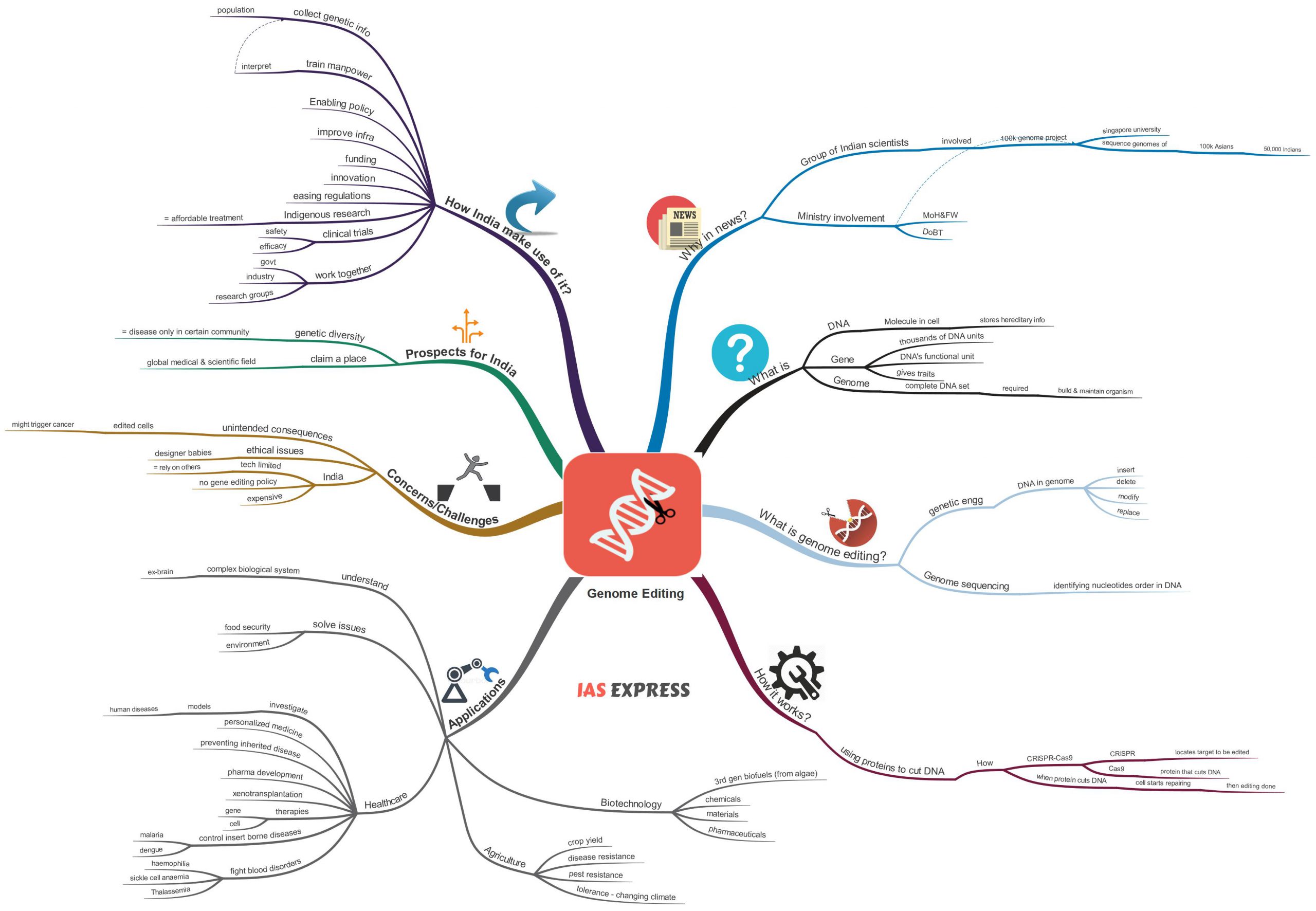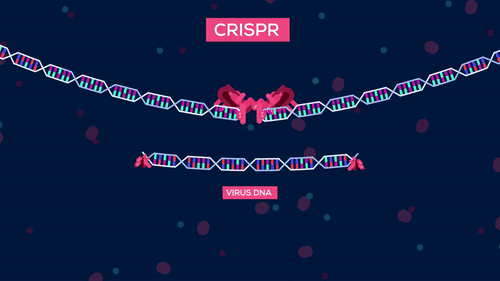Genome Editing/Sequencing Technology in India: Pros, Cons & Ethics

From Current Affairs Notes for UPSC » Editorials & In-depths » This topic
IAS EXPRESS Vs UPSC Prelims 2024: 85+ questions reflected
The proposal for Indian regulators to recognize a new gene-editing technique has been pending with the Genetic Engineering Appraisal Committee for nearly two years.

What is DNA, Gene, and Genome?
- DNA is the molecule in the cell that stores a person’s hereditary information and gets transmitted from generations to generations.
- Gene is made up of a couple of thousands of DNA units. Gene is a functional unit of DNA that gives the organism its traits like skin color, hair color and eye color by means of a unique sequence of DNA bases.
- A genome is an organism’s complete set of DNA, including all its genes. Each genome holds all the information required to build and maintain that organism.
What is genome editing/sequencing?
- Gene editing is a type of genetic engineering in which DNA is inserted, deleted, modified or replaced in the genome of a living organism.
- Compared to early genetic engineering techniques that randomly insert genetic material into a host genome, genome editing targets the insertions to site-specific locations.
- Genomic sequencing means figuring out the order of DNA nucleotides or bases in a genome viz – Adenines, Guanines, Thymines, and Cytosines.
How does genome editing work? (CRISPR-Cas9)
- Genome editing techniques use certain proteins that can cut DNA in a precise and targeted location.
- Among the recent genome editing technologies, CRISPR- Cas9 proves to be promising since they are faster, efficient, low cost, accurate and easy to use and can edit at multiple sites in the genome in a single go.
- CRISPR stands for ‘Clustered Regularly Interspaced Short Palindromic Repeats’. This refers to the basis of the ‘guide system’ that locates the ‘target’ i.e., the specific sequence of the DNA that is to be edited.
- Cas9 stands for ‘CRISPR-associated protein 9’, the protein that cuts the DNA at the target site.
- When the protein cuts the DNA at a specific sequence, it will be started to get repaired by the cell, at which time, a change or ‘edit’ is made to the sequence.
What are the applications of genome editing technology?
- It facilitates the understanding of even the most complex biological systems like the brain.
- It is a powerful tool that can change the way society deals with many issues of healthcare, food scarcity, and the environment.
- Healthcare:
- It helps in investigating models of human diseases.
- It helps in the development of personalized or individualized medicine by extracting precise information stored in each human’s DNA (their genome).
- Preventing the inheritance of a disease trait from parents to the child.
- Pharmaceutical development, xenotransplantation (A surgical procedure in which tissue or whole organs are transferred from one species to another species), gene and cell-based therapies, control of insect-borne diseases.
- Engineering mosquitoes to control malaria and dengue.
- It helps in the fight against blood-related disorders like haemophilia (uncontrolled bleeding), sickle cell anaemia (abnormal RBCs), and Thalassemia (faulty haemoglobin synthesis).
- It helps in finding drugs for rare genetic diseases, which the drug industry does not manufacture because of the high costs involved.
- Agriculture and Animal husbandry: Increasing crop yield, introducing resistance to disease and pests, tolerance of different environmental conditions.
- Industrial biotechnology: Developing Third generation biofuels (derived from algae) and producing chemicals, materials, and pharmaceuticals.
What are the concerns/challenges with this technology?
There is a growing fear that the gene-editing system is being prematurely used for clinical purposes.
- It is because there are reports of unintended consequences of the CRISPR-Cas9 system.
- A study found that the system introduces unexpected off-target (outside of the intended editing sites) effects in Mice.
- It has also been reported that CRISPR-Cas9 edited cells might trigger cancer.
There are several ethical issues associated with gene editing.
- Bioethicists fear abuse of gene editing by governments and the private sector.
- Editing gene to create babies that are desired by parents would make them more like commodities.
There are also various technical issues with respect to gene editing
- It can create unforeseen changes in the genome which are undesirable.
- Gene editing technology is still limited in India. Hence we have to rely on solutions developed in other countries for domestic problems. Also, India is yet to come up with a comprehensive gene editing policy.
- These solutions may be expensive and also not entirely suitable for our specific needs.
What is the 100k genome project?
- It seeks to sequence the genomes of 1 lakh infectious microorganisms to create a database of bacterial genome sequences.
- The database will be used in public health, detection of disease outbreaks and bacterial pathogen detection or diagnosis.
- It will provide a roadmap for developing tests to identify pathogens and trace their origins more quickly.
- It also set out to map genetic variations in humans across the world and sequenced about 1092 persons from 14 different populations. The resulting 20,000 GB of raw data will be the basis for understanding human genetic variations.
What are the prospects for India?
- India is more genetically diverse with around 5000 ethnolinguistic and religious groups all of which probably have some genetic differences.
- The genetic implication is that there are likely to be several recessive diseases stemming from single genes specific to individual groups that can be identified.
- This knowledge could then also be applied to the task of managing diseases in these groups and also be used for genetic counselling that could minimize their incidence in future generations.
- This technology will offer India a chance to claim a piece of the global medical and scientific frontier.
How could India make use of this technology?
- To get gain from the genomics revolution, India needs to collect information about the genetics of its population and train manpower capable of interpreting it.
- The genome-editing technology requires enabling policy to make sure that their outcomes are in line with the spirit of their promises.
- The government needs to improve infrastructure, access to funds and promote innovation in this field.
- Regulatory reforms are also needed to expedite approvals and make it easier to conduct research.
- Encouraging indigenous gene editing research is crucial to make treatments available at affordable costs.
- Clinical trials should be conducted with the utmost safety and efficacy.
- Clinical research can be accelerated through working together with government, industry and research groups.
What are the related Laws in India?
- In India, many rules, guidelines, and policies supported by the “Rules for the Manufacture, Use, Import, Export and Storage of Hazardous Microorganisms/Genetically Engineered Organisms or Cells, 1989” notified under the Environment Protection Act, 1986, governs genetically modified organisms.
- In addition, theNational Ethical Guidelines for Biomedical and Health Research involving human participants, 2017, by the Indian Council of Medical Research (ICMR), and the Biomedical and Health Research Regulation Bill proposes regulation of the gene-editing process.
- This is particularly true in the usage of its language “modification, deletion or removal of parts of heritable material”.
- Nonetheless, there is no specific mention of the term gene editing.
Way ahead
Responsible use of genome editing could be the solution to some of India’s pressing problems. It is high time that India utilizes this cutting-edge tool to its own needs and ensure affordable health care for all its people.
Practice Questions
- What do you understand by CRISPR Cas9 editing technology? There is a growing fear that the promising gene-editing system is being prematurely utilized for clinical purposes. Examine.
- Should humans take control of their genetic fate, and rewrite the DNA of future generations? Discuss.
If you like this post, please share your feedback in the comments section below so that we will upload more posts like this.



